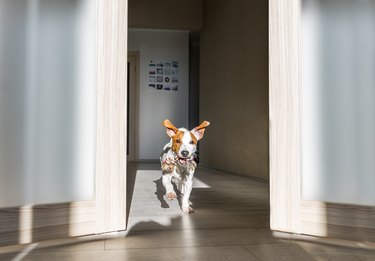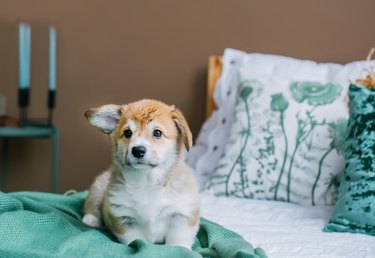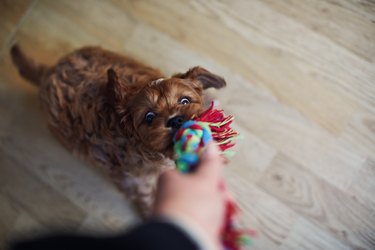Your new puppy is so adorable. He has the cutest little face, a high-pitched bark, and the best breath in the world. However, he's always nipping at your heels and attacking your feet and ankles.

While you want to have fun with your pup, it's not enjoyable when he's biting your feet with his sharp teeth. In fact, it's very painful sometimes and causes you to trip when you're walking around your house.
Video of the Day
Video of the Day
You want to know why your puppy is biting your feet as well as how to teach your puppy not to do it. Then, you and your puppy can play all day long without anyone getting hurt.
Why puppies love biting your feet
In their first few weeks of life, when puppies are bonding with their siblings, they learn how to play. They do this by roughhousing and biting their siblings' feet, ears, and tails. When their siblings yelp, that's a signal to stop biting. Usually, puppies learn through this not to bite as much. But when yours came home, he might still be exhibiting this type of behavior. This may be especially true if you got a dog that was in a shelter for a long time. He could take awhile to adjust.
Additionally, since you move your feet, it looks like moving prey to a dog. In the wild, dogs will see moving things, such as other animals, and go after them. And if your puppy's breed is known for herding, then he will treat your feet like the animals he needs to round up. When you move your feet away to stop him from attacking your feet and ankles, he'll just want them even more and may become increasingly aggressive.
In general, puppies bite anything because they are teething. Plus, they want your attention. Even if you sit down and stop moving your feet, your puppy may still come up and bite you to say, "Look at me!" They simply hope to play with you, and often, it works.

How to stop your puppy from attacking your feet and ankles
There are some practical things you can do to stop your puppy from biting your feet. You can avoid wearing shoes with laces and long pants, skirts, or dresses that your dog could latch onto (and then end up biting your feet). If you move your feet around while your puppy is trying to bite them, he's going to think it's a game and want to do it again in the future.
Dogs show one another that the biting hurts and to stop by yelping. When your puppy bites you, you can let out a loud yelp to communicate to him, "this is too much." He should back off after that.
If you stop moving your feet, hopefully, your puppy won't keep nipping at your heels. Then, redirect his attention with a treat or a chew toy and then tell him, "good dog!" when he goes for the treat or toy instead of your feet. This way, you're demonstrating to your puppy that when he goes for a toy or treat instead of your feet, he is behaving well. He will want the reward instead of nothing.
You'll also have to be patient with your puppy. It can take several months to house train him; training him not to bite you could take a while as well.
Remember that dogs need to be on schedules and have positive reinforcement in order to learn. Make sure your puppy goes to bed, wakes up, eats, and goes outside to do his business around the same time every day. Whenever he does something good, reward him. When he does something bad, don't yell at him, because negative reinforcement does not work.
Hang in there, because if you are disciplined when it comes to training your pup, he will learn to behave how you want him to and be set for the rest of his life.

Getting the right toys for your puppy
You'll need to get your puppy the right toys to play with so he won't go after your feet and ankles. Buy toys that are his size, as opposed to ones designed for bigger dogs. A good chew toy shaped like a bone will keep him occupied and help him with teething. All dogs love toys that squeak and have some sort of food inside. You could fill a puppy-sized Kong with peanut butter, which will keep him entertained for a while and satisfy his tastebuds.
Making your sure your puppy gets playtime
Puppies want to play because they have a lot of energy and they love their owners. If you constantly ignore your puppy, he could develop negative habits.
You'll need to keep your puppy mentally stimulated. Every 90 minutes or so, play with him for 10 to 15 minutes. Throw a chew toy, let him run around on the lawn and see if he wants to nicely play with the other dog in your home, if you have one.
If you are keeping your other dog separate from your puppy until your puppy is fully vaccinated, then find people with puppies around your dog's age. They can safely play with each other and get all of their energy out.
If you have children in your home, you'll have to be careful when exposing them to your puppy. It's one thing if he's biting your feet, but if he's biting your small children's feet and ankles, that could really hurt them. They may not be able to communicate that it hurts, either, so your puppy will keep on doing it. Those negative behaviors may be reinforced.
Conclusion
Puppies love to bite feet and ankles with their sharp teeth because they want to play with you like they play with other dogs. With some positive reinforcement, you can teach your dog to stop nipping at your heels and go after chew toys instead. Then, your feet and ankles will feel better, and your puppy will be properly stimulated and happy.